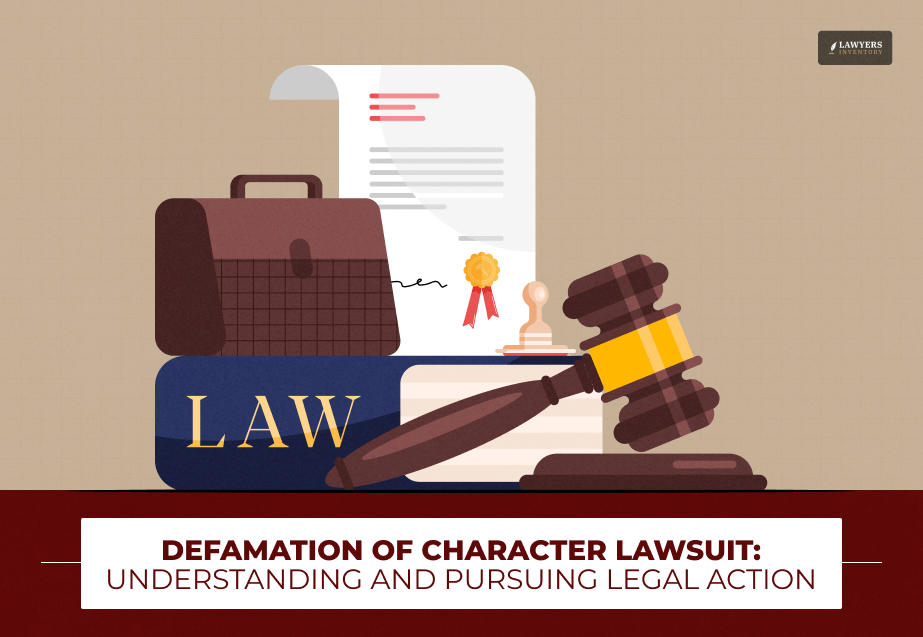
Today we talk about the Defamation of character lawsuit. Your reputation is one of your greatest assets. When your reputation is attacked unfairly, the damage can be catastrophic both professionally and personally. That is why there is such a thing as the defamation of character lawsuit. It offers a legal remedy for victims to find compensation and redress.
The awareness of this legal recourse is of priceless value to any person who has had their good reputation smeared. We will take you through the major components of a claim for defamation of character. We cover everything from defining the action to estimating the potential damages. Thus, our defamation lawsuit guide makes an area of law that is difficult to understand easier to understand.
What Is Defamation Of Character In A Defamation of Character Lawsuit?
Defamation of character occurs when someone falsely accuses another party.
1. Libel vs. Slander
The statement must harm the reputation of the individual. Law divides defamation into two broad categories, i.e., libel and slander.
2. Libel
Defamation of Character Lawsuit arises out of instances that are defamatory by a permanent, fixed means of communication. These are written words, e-mail, web posting, photographs, or broadcasting. Because it is in written form, libel reaches more people and does more permanent harm.
3. Slander
It is oral, transitory words. Slander is by word of mouth, bodily movements, or other forms of expression that are unstable.
For a Defamation of Character Lawsuit, the first priority is defamation of character. The published statement should meet all the standards of the law, according to Forbes Advisor.
Legal Requirements For A Defamation Case

If you are going to win a defamation of character case, you can’t just make an accusation based on injured feelings. You must prove four definite things. They are a complete and actionable complaint.
Here are the four essential elements of defamation of character lawsuit. If you are suing for defamation of character, you will need to have evidence of each of the following items.
1. A False Statement of Fact
The statement must be false. Opinion or rhetorical hyperbole is not defamation. The statement must be uttered in some form that will make it seem like a statement of fact.
2. Publication
For a Defamation of character lawsuit, the defamatory statement must have been conveyed to some third party. That is, to someone other than the speaker and the injured person defamed.
3. Fault
You must show that the defendant was negligent or acted with malice. For ordinary citizens, proving negligence must be sufficient most of the time. For public figures (i.e., politicians or celebrities), it’s far more difficult. They must show “actual malice”- the defendant knew the statement was false or was in reckless disregard of the truth.
4. Harm (Damages)
The defamatory statement should have done actual damage to your reputation or should have led to actual loss of reputation or income.
Damages In Defamation Of Character Lawsuit

If you ask, how much can I sue for defamation of character, the answer is entirely dependent upon the nature of harm that you can prove.
Damages are meant to compensate the victim for reputation damage and related losses. Here are the types of damages that you should know about:
1. Compensatory Damages
They are most commonly applied and are classified into two:
2. General Damages
They encompass damages aside from monetary ones. These include pain and suffering, emotional distress, and humiliation arising out of defamation.
Quantifying the extent of emotional distress is one of the characteristics of the Defamation of character lawsuit.
3. Special Damages
These are physical, measurable monetary damages. Some of them include lost wages, lost business opportunity, or the value of forfeiting a contract due to the defamatory statement.
4. Punitive Damages
Judges don’t usually award these that frequently. Punitive damages aren’t to cure the victim. Instead, they punish the defendant for outrageous or wanton conduct. They serve as a deterrent for future conduct of that kind as well.
To be eligible for punitive damages arising out of a Defamation of character lawsuit, you need to prove the defendant was in conscious disregard of your rights, according to BDBLaw. The severity of the claim on your character defamation case normally determines whether or not such will be awarded by the court.
Defamation Defenses
Just because the statement is offensive, though, does not mean that the defamation of character lawsuit will prevail.
Common Defenses To Defamation
Defendants have a number of strong defenses to challenge the claim. It is worth knowing about them before you file.
Truth
The defense of all defenses. If the defendant can prove that the statement is fundamentally true, the request for defamation of character will fall flat. Defamation is based on the fact that the statement is untrue.
Opinion
Opinion comments are generally outside of First Amendment bounds. A reasonable person has to realize that the statement is subjective rather than an objective factual statement.
“But, as the U.S. Supreme Court made clear in Matal v. Tam (2017): “Giving offense is a viewpoint.”
The Court elaborated on this point two years later in Iancu v. Brunetti (2019), explaining that the judgment of whether speech is “immoral,” “scandalous,” or otherwise offensive “distinguishes between two opposed sets of ideas: those aligned with conventional moral standards and those hostile to them; those inducing societal nods of approval and those provoking offense and condemnation.” – 2025 Foundation for Individual Rights and Expression.
Therefore, in these cases, the statement will be non-actionable as defamatory.
Privilege
Some communications are privileged at law.
Concepts of Privilege are of two types in a Defamation of character lawsuit.
1. Absolute Privilege
These are statements made in court or legislative proceedings. Proof of witnesses in court, for example, is generally privileged.
Read Also: What Proof Do You Need for a Restraining Order?
2. Qualified Privilege
This protects statements made in good faith under certain circumstances, i.e., an employer making a reference. According to FindLaw, the privilege is lost if the statement was made maliciously.
3. Consent
If the plaintiff consented to the publication of the statement, he/she cannot sue for defamation later. This is even if the statement proved to be damaging.
Suing for defamation of character is a last resort. You will be forced to go through a few very critical steps of preparation before you even sue. Preparation can win or lose your case.
Documenting The Harm
Start by gathering as much evidence as you possibly can in a Defamation of character lawsuit. This is not something you do in a good case.
1. Gather The Evidence
Take pictures of photocopies of screenshots of web postings or obtain written duplicates of what is posted. Note date, time, and location of publication.
2. Get Witnesses
Obtain names and phone numbers of anyone who witnessed or overheard the libelous statement read aloud. Witness testimony can prove the element of “publication” required.
3. Track Damages
Keep careful records of losses. Lost business, missed job opportunities, or losses in income resulting from the false statement are all included. Document as well as emotional damage through journals or counselors’ reports.
Read Also: Nightfall Group Lawsuit- Claims, Legal Ramifications, And Consumer Consequences
Defamation Of Character Lawsuits: Real-Life Examples And Defamation Case Studies
High-profile cases will most effectively illustrate the complexity and high stakes of the defamation of character case. They illustrate the high personal and monetary stakes.
1. The Depp v. Heard Trial
The recent high-profile Defamation of Character Lawsuit illustrated the challenge of proving defamation in domestic disputes and media reporting. The jury had to weigh evidence of actual malice and whether the words were fact or opinion.
2. Hulk Hogan v. Gawker Media
The Hulk Hogan v. Gawker Media case was a landmark defamation of character lawsuit against the media company reached a record-breaking verdict. It established the difference between public figures and private individuals, and strict liability for the publication of private intimate information. The case reshaped the climate for internet media and privacy expectations.
3. Oprah Winfrey Beef Defamation Trial
If a comment had to be made about the safety of beef on her show, the ranchers of cattle sued for character defamation. The trial showed how spontaneous remarks by powerful figures can lead to lengthy, expensive trials. Additionally, the outcome depends largely upon state statutes and what is considered fact and what is not.
Consult The Counsel Of A Lawyer In A Defamation Of Character Lawsuit
Don’t try to sue for defamation of character yourself. A lawyer specializing in defamation can evaluate your case properly. They will tell you if you are eligible to sue for defamation of character where you are. They help you determine the likely cost and time factor involved.
If you think you’ve been defamed, move quickly and intelligently.
1. Speak With An Attorney
Speak with an expert attorney specializing in defamation law prior to taking any action. Your attorney provides you with sound advice regarding how to present a case of defamation of character.
2. Your Evidence Arsenal
Collect all your evidence, such as screenshots, witness testimony, and any other documents which is in your favor.
3. Attempt Alternative Dispute Resolution
Try settlement or mediation. Settling the case out of court takes time and money.
4. Be Online Savvy
Take care of your reputation on the internet. Take action quickly against defamatory material online, usually by a cease-and-desist letter from your attorney, before filing the whole defamation of character suit.
What Happens Next? Time Limits And Proving Fault
There is a statute of limitations in the state. This is how long you have to bring your action for defamation of character. This is usually short, sometimes only one year from publication.
Don’t delay. Selection of an appropriate jurisdiction is also crucial, especially with Internet defamation, since the publication is global. An attorney will have to walk you through the laws of these individual states.
Read Also: How To File A Civil Lawsuit In The Easiest Way Possible?
Frequently Asked Questions (FAQs):
The path to a successful case for defamation of character is precision, unblemished evidence, and good representation. Reputation rehabilitation is worth the fight, but preparation is the game.
Ans. Yes, but far more onerous for public figures than for individuals. They must establish that the statement was published with “actual malice,” i.e., that the defendant had knowledge that the statement was false or in reckless disregard of the truth in publishing it.
Ans. Jurisdiction is the biggest hurdle in defamation of character cases today. Determining where the publication occurred and under which law to apply where material is read all over the world via sources such as X or Facebook is highly intricate and requires a specialist’s knowledge of legal strategies.
Ans. How much you can recover for a defamation of character lawsuit hinges largely upon established harm. It can be zero to millions in star or high-profile cases of financial damage or ill will. Most do settle out of court. However, a typical compensatory award to a private party will be smaller and difficult to quantify in dollar amounts.




![Why Are People Searching For A Roblox Lawsuit Lawyer At Dolman Law? [Complete Guide]](https://lawyersinventory.com/wp-content/uploads/2026/02/roblox-lawyer-dolmanlaw.com-roblox-lawsuit-100x100.png)







0 Reply
No comments yet.